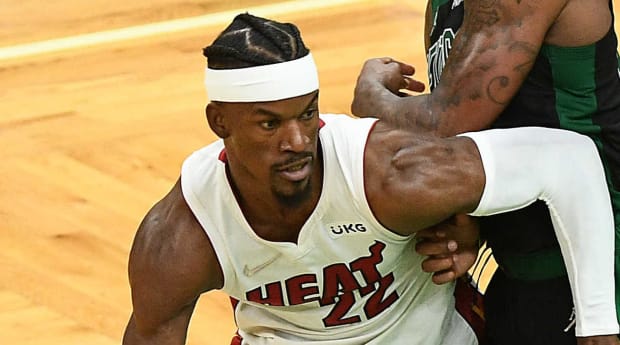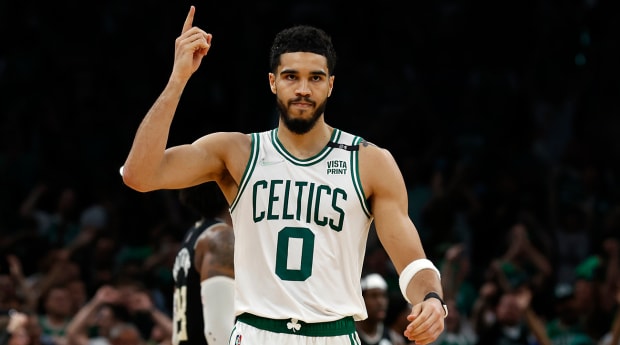View the original article to see embedded media.
Celtics vs. Heat. Game 7. What are the biggest questions heading into the winner-takes-all matchup? Who will advance to the NBA Finals? We have you covered.
Three Questions for the Heat
Which Jimmy Butler will show up?
In Games 3–5, Jimmy Butler scored 27 points total, missing half of Game 3 due to a knee injury and returning only to be a shell of himself in Games 4 and 5, both Heat losses. In Game 6, Butler put together arguably the finest performance of his career, scoring 47 points along with nine rebounds, eight assists and four steals. It may not be more simple for Miami in Game 7 than getting a great Butler game as opposed to a mediocre one. His two 40-point efforts in this series coincided with the Heat’s two most impressive wins. The common thread in those games were elite shotmaking and getting to the free-throw line. In Games 1 and 6, Butler went to the line 29 times combined. In Games 2–5, Butler attempted only 14 free throws, including none in Game 4.
The key to Butler’s success in the playoffs has been his excellence in the pick and roll. He ran only 4.3 per game as the ball-handler during the regular season. In Game 6, he ran 13, including six alone in the fourth quarter, per Synergy Sports. In the postseason, Butler overall is running more pick and rolls every night, and he’s averaging 1.16 points per possession—an elite mark. If the downhill, finish-at-the-rim-through-contact Butler is available for the Heat, their chances of winning increase exponentially. If Butler is playing tentatively on his knee and screening more often than attacking with the ball, Miami will be in trouble. (A few more threes and late-clock turnaround jumpers wouldn’t hurt, either.) —Rohan Nadkarni
Can the three-point shooters get going?
In the regular season, Miami led the league in three-point shooting at 37.9%. In the conference finals, the Heat are shooting only 31.5% from deep, the worst of any team from the final four. Boston deserves a ton of credit for suffocating Miami’s shooters. The Celtics’ ability to switch one through five makes it hard for any wing players to shake loose coming around screens. And Derrick White in particular has done a great job chasing around Max Strus when both are in the game. Meanwhile, Miami’s inability to consistently attack the rim means the defense isn’t collapsing into the paint. In the regular season, the Heat were second in the league attempting 11.1 corner threes a game, and second best in converting them at a 41.9% rate. Against Boston, Miami is putting up only 9.3 corner threes a game, connecting on a pitiful 26.8%—thanks in no small part to Robert Williams’s ability to close out from the lane to the corners.
Are the Heat due for a big shooting night? The Celtics do drop at times on screens, often with Williams. Kyle Lowry, Max Strus, Gabe Vincent and maybe even Victor Oladipo may need to step into and hit some big shots. And if Butler does start applying pressure inside, that could open up opportunities as well. One issue for Miami is as the rotation has tightened, that has made less space for some of its best shooters. If the Heat are finally able to get going from outside, that could help their otherwise moribund offense. —R.N.

Brian Fluharty/USA Today Sports
Can the Heat keep forcing turnovers?
This is really the big battleground in this series. Miami can’t score in the halfcourt, and the Celtics are generally better equipped to do so—even against the Heat’s stout defense—because of their combination of size and shooting. When Miami stacks up Celtics turnovers, its chances of winning go through the roof. In the Heat’s three wins this series, Boston has 56 turnovers. In the Heat’s three losses, Boston has only 33.
Part of the issue is the Celtics’ shaky passing. But Miami’s defense deserves credit. Butler is constantly lurking in passing lanes, and the Heat do a great job of crowding Jayson Tatum and Jaylen Brown whenever they crash the paint. P.J. Tucker and Oladipo have been absolute ballhawks, and Miami seems O.K. living with some open threes if it means the team can get out in transition and score some easy buckets. If the Heat continue to dig, strip, steal and intercept in Game 7, they’ll give themselves an opportunity to score enough points to win. If they can’t keep generating live-ball turnovers, the contest tips back in Boston’s favor. —R.N
Three Questions for the Celtics
How much time will Boston spend in small lineups?
It’s hard to glean too much from lineup data in a six-game sample size, particularly when it’s culled from a back-and-forth series that’s full of blowouts. But when push comes to shove, Ime Udoka really trusts his defense with Derrick White and one big on the floor. In Game 6, he rode White, Al Horford, Marcus Smart, Jaylen Brown and Jayson Tatum for most of the fourth quarter and, if not for some historic shot making by Jimmy Butler and Kyle Lowry and two crucial misses at the free-throw line by Brown, it would’ve sent them to the Finals.
That specific group has answers on both ends. They can flatten out Miami by switching every ball screen (Butler hunts White but it’s not much of a mismatch) and, on the other end, have five playmaking threats who can knock down open threes and make good things happen when the Heat double Tatum. The downside of this group, though, is it pushes Rob Williams III and Grant Williams—two of the best defenders in the league—to the bench. Udoka will ride hot hands and see how small Miami is willing to go before he commits to any one group in a close game, but it’ll be interesting to see how soon he deploys this five-man unit, which didn’t make its first appearance in the conference finals until the second quarter of Game 5. —Michael Pina

Winslow Townson/USA TODAY Sports
Can Tatum be a monster?
In Games 4, 5 and 6 of the conference semifinals against Milwaukee, Tatum scored 12, 12 and 16 points in the fourth quarter. In this series, he hasn’t had the same type of impact. Some of that’s due to those aforementioned blowouts (Tatum played three total minutes in the fourth quarter of Games 2 and 4) and some can be illustrated by the differing defensive strategies by the Bucks and Heat. But short of them building another 20-plus point lead on the road, Boston’s path to the Finals gets a lot less bumpy if Tatum establishes himself as the series’ best player in its final 12 minutes.
In Game 6, he took a playoff-low 12 shots and tied his playoff-high with seven turnovers. Tatum doesn’t need to take and make difficult shots for the Celtics to prevail, but he can’t cough the ball up and float through critical second-half possessions without bending Miami’s defense and creating open shots for his teammates. In theory and practice, he’s the skeleton key for Boston’s offense, the star who consistently draws two and opens up opportunities for everyone else. The Celtics don’t lose when he’s decisive. In Game 7, he’ll have to be. —M.P.
Will Boston take care of the ball?
Turnovers have been the Celtics’ Achilles’ heel all series long. In eight games all year, they’ve posted a turnover rate that’s above 19%. Two of them have occurred in the conference finals, and before that the last one came on Jan. 28. Brown’s 19 turnovers in the series are tied for the second most he’s ever tallied in the playoffs over a six-game stretch. Tatum’s 31 turnovers are tied for the most he’s ever tallied in the playoffs over a six-game stretch. When unforced and live-ball, they ignite a Miami offense that’s managed to score only 87.3 points per 100 possessions in the halfcourt (a mark worse than what the last-place Pistons generated during the regular season).
All series long, Udoka has cautioned his stars against playing in a crowd. Don’t drive too deep into Miami’s defense and then look to make a play. Get off the ball. Move and relocate. A lot of this is easier said than done against a ravenous, hyper-intelligent group that’s constantly reaching for the ball, stunting in and out of passing lanes. But when Boston doesn’t make unnecessary mistakes, they’re the better team. —M.P.
Prediction: Who wins?
Pina: Boston. In the history of the conference finals, there have been 25 Game 7s. Only eight road teams have survived. Nothing will be easy for the Celtics on Sunday night against a confident Heat team that features several gutsy veterans who won’t be rattled by the moment. But Boston is healthier, with a defense that has fewer points of vulnerability. Tatum’s 46-point performance in Game 6 of the previous round shows he can rise to the challenge in a hostile environment. The Celtics have two dominant wins in this series at FTX Arena already, and have not lost twice in a row for the entire postseason. Miami’s recipe for victory was seen in Game 6, and it required some insane shot making. Odds are they can’t do it again.







